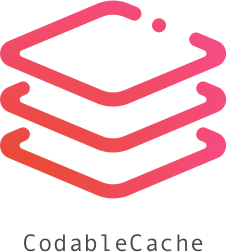CodableCache 0.2.2
| TestsTested | ✓ |
| LangLanguage | SwiftSwift |
| License | MIT |
| ReleasedLast Release | Dec 2017 |
| SwiftSwift Version | 4.0 |
| SPMSupports SPM | ✓ |
Maintained by Macbook.
CodableCache 0.2.2
- By
- Andrew Sowers
- andrewsowers
📦 📲 CodableCache
What is CodableCache? It's a framework that allows for seamless memory caching and disk persistence of your plain old Swift structs. Simply define a model and conform to Codable – you're ready to use CodableCache.
📋 🧐 Features
- Simple to use transparent cache based on keys and generic types
- Anything that's
Codableworks automatically - No serializers to write other than optional custom
Codableencode/decode - Works with images via codable wrapper
- Easy to integrate into existing workflows
- backed by battle tested NSCache and NSKeyedArchiver
- batteries included - by design, it's up to you to create workflows and handle cache errors
🎓 📕 Some History
Codable Cache is a drop in replacement for my LeanCache framework, which was backed by specifying generic types conforming to NSCoding. It afforded workflows like let x: NSNumber? = Cache<NSNumber>("some interesting key") and that's still great, but writing serializers for NSCoding is a pain. Hence, CodableCache was born.
👩💻 👨💻 Example Code
To get started, just import CodableCache, define a model that conforms to codable, and get coding. These are just a few examples of how you could use CodableCache.
Create a person manager backed by a persistent cache:
import CodableCache
struct Person: Codable {
let name: String
let age: Double // kids are half ages if you recall 😜
}
final class PersonManager {
let cache: CodableCache<Person>
init(cacheKey: AnyHashable) {
cache = CodableCache<Person>(key: cacheKey)
}
func getPerson() -> Person? {
return cache.get()
}
func set(person: Person) throws {
cache.set(value: person)
}
}
And later use it like so:
let personManager = PersonManager(cacheKey: "myPerson")
try? personManager.set(value: MyPerson)
if let person = personManager.get() {
print(person.age)
}Cache JSON with confidence:
import CodableCache
//...
struct TestData: Codable {
let testing: [Int]
}
func saveJSON() {
let json = """
{
"testing": [
1,
2,
3
]
}
"""
guard let data = json.data(using: .utf8) else {
return
}
let decodedTestData: TestData
do {
decodedTestData = try decoder.decode(TestData.self, from: data)
try codableCache.set(value: decodedTestData)
} catch {
// do something else
return
}
}
Get your cached JSON for later use:
import CodableCache
final class AppDelegate: UIResponder, UIApplicationDelegate, UNUserNotificationCenterDelegate {
let appSettings = CodableCache<Settings>(key: "com.myApp.settings")
func application(_ application: UIApplication, didFinishLaunchingWithOptions launchOptions: [UIApplicationLaunchOptionsKey: Any]?) -> Bool {
if let settings = appSettings.get() {
doSomethingUseful(with: settings)
}
return true
}
// ...
}
Specify a different storage directory:
import CodableCache
struct Person: Codable {
let name: String
let age: Double
}
// this data will not be purged by the system like .cachesDirectory would
let persistentPersonStorage = CodableCache<Person>(key: "myPerson", directory: .applicationSupportDirectory)
Creating a generic cache:
import CodableCache
final class GenericCache<Cacheable: Codable> {
let cache: CodableCache<Cacheable>
init(cacheKey: AnyHashable) {
self.cache = CodableCache<Cacheable>(key: cacheKey)
}
func get() -> Cacheable? {
return self.cache.get()
}
func set(value: Cacheable) throws {
try self.cache.set(value: value)
}
func clear() throws {
try self.cache.clear()
}
}And later use it like so:
let myCache = GenericCache<MyType>(cacheKey: String(describing: MyType.self))👩🔬 👨🎨 Philosophy
Using something heavyweight like CoreData, Realm, or SQLite is often overkill. More often than not we're just backing up some local state based on some JSON interface – using a spaceship for a walk down the block CodableCache we take a different approach by allowing you to quickly define models, skip boilerplate / serializers, and start saving your data at a lightning pace.
💻 🚀 Installation
Cocoapods
CocoaPods is a dependency manager for Cocoa projects. You can install it with the following command:
$ gem install cocoapodsCocoaPods 1.1+ is required to build CodableCache.
To integrate CodableCache into your Xcode project using CocoaPods, specify it in your Podfile:
use_frameworks!
target '<Your Target Name>' do
pod 'CodableCache'
endThen, run the following command:
$ pod installCarthage
Carthage is a decentralized dependency manager that builds your dependencies and provides you with binary frameworks.
You can install Carthage with Homebrew using the following command:
$ brew update
$ brew install carthageTo integrate CodableCache into your Xcode project using Carthage, specify it in your Cartfile:
github "asowers1/CodableCache" "master"
Run
carthage update
In your application targets “General” tab under the “Linked Frameworks and Libraries” section, drag and drop CodableCache-iOS.framework from the Carthage/Build/iOS directory that carthage update produced.
Swift Package Manager
The Swift Package Manager is a tool for automating the distribution of Swift code and is integrated into the swift compiler. It is in early development, but Alamofire does support its use on supported platforms.
Once you have your Swift package set up, adding CodableCache as a dependency is as easy as adding it to the dependencies value of your Package.swift.
dependencies: [
.Package(url: "https://github.com/asowers1/CodableCache.git")
]🙋 🙋♂️ Contributing
Feel free to open an issue or pull request – I would be happy to help.





